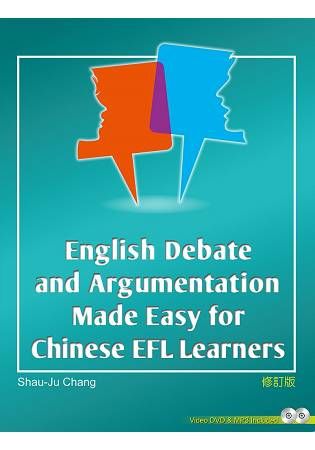圖書名稱:English Debate and Argumentation made Easy for Chinese EFL Learners(with Video & MP3)(修訂版)
This book results partially from a multi-year research project (entitled “Incorporating Debate-related Training into High School English Curriculum”) I conducted from 2007 to 2010 under the sponsorship of National Science Council (now called Ministry of Science and Technology), and partially from my years of experience in teaching English debate to college and high school students in Taiwan. As a teacher, researcher and judge of English debates, I know well the educational values debate holds for learners of English at all levels in advancing their basic language skills, public speaking, critical thinking, organization and researching abilities. At the same time, I am also highly cognizant of the challenges Chinese EFL learners face when engaged in such a culturally unpopular and unfamiliar oral activity,and am convinced that these challenges need to be pointedly addressed if we are ever to see our students benefit from the merits of English debate and thrive in their future academic and professional lives.
It is in that conviction that the book English Debate and Argumentation Made Easy for Chinese EFL Learners was born. The book is arranged into three sections: Generic Critical Thinking Skills, Argumentative Discourse Skills, and Debate Basics. I consider the critical thinking skills included in the book “generic” because I see them as prototypical skills that can be applied to myriad tasks entailing critical thinking. Argumentative discourse skills, on the other hand, are intended to cultivate learners’ linguistic competence in argumentation. Here critical thinking and argumentative discourse skills are seen as the two categories of skills that constitute the essence of any form of argumentation. As a step further, materials included in Debate Basics are,
however, geared toward preparing students for a more formal and advanced form of argumentation,specifically competitive policy debate. The arrangement of the book thus facilitates students of different English proficiency levels in learning argumentation. For the low- and intermediate-level learners, units in sections I and II will meet their needs.
For the highlevel learners and particularly those who are to undertake competitive debate,after finishing units in sections I and II, units in section III are useful in providinga simple but clear blueprint for the essential knowledge and skills entailed incompetitive English policy debate.
Generic Critical Thinking Skills
This section is divided into six units. They are sequenced in an order I consider most conducive to students’ learning of critical thinking skills. The section starts with helping students distinguish facts from opinions. It then teaches them how to detect and clarify vagueness or ambiguity in meaning. By now, students are ready to learn the basic ARE (Argument = Assertion + Reasoning + Evidence)structure of an argument. From there, two types of argument—inductive and deductive—and their respective subtypes are introduced. Just as it is important to learn sound reasoning, it is essential to guard against faulty reasoning.Common fallacies are included and expounded. To further explore the other component of an argument, there is also a unit on use of evidence.
Different types of support, guidelines for using and testing the support, and language for expressing the support are addressed.
Argumentative Discourse Skills
Seven discourse skills fundamental to conducting argumentation are included in this section,and they are Soliciting and Expressing Opinions, Using Fillers and Disclaimers,Using and Challenging Reasons and Support, Agreeing, Disagreeing, Questioning, and Refuting. Useful expressions are introduced for each discourse skill. Among the seven skills, I consider disagreeing, questioning, and refuting more deserving of attention, particularly for students from collectivistic cultures who are lacking practice of those skills. Living in a group-oriented society where harmony is emphasized and confrontation avoided, students there have been cultured to openly agree but keep disagreement in check. Living in such as ociety, it is also no surprise that they
are discouragedto delve into matters with multiple questions or challenge others’ opinions andthus run the risk of being seen as a dissident or boat-rocker. Guided by the perceptionthat westerners are more direct, students from these collectivistic cultures overcompensatefor their indirectness, and were often found to fail to use disclaimers andthus come across as insensitive or impolite. Because of these reasons, Isuggest
that therationale behind these units be made explicit and heightened for students so asto strengthen their incentive to learn those discourse skills. While the genericcritical thinking units are better approached in a certain order, the discourseskills, however, can be taught in whichever sequence you see suitable for yourstudents. Following these seven discourse skills are some integrated exerciseswhere learners can put into practice the verbal expressions they have acquired.
Debate Basics
To familiarize students with the most fundamental concepts and to equip them with the most basic skills for competitive policy debate, nine indispensable units were put together for preparing students for competitive policy debate. The section sets off with basic concepts such as wording Debate Propositions, and Sock Issues and Prima Facie Cases. It then moves on to address the structures and strategies of Affirmative and Negative Cases. The unit on Content and Language of Debate Speeches is composed specifically for acquainting EFL students with the content, organization and unique
discourse found in debate speeches. Equally pivotal and challenging for EFL learners when engaged in English debate are the tasks of cross-examination and refutation. To help them ask and respond to questions and refute arguments, two units were constructed:one on Guidelines, Techniques and Language of Cross-examination and the other on Guidelines and Language of Refutation. Knowing how shortchanged students maybe in their research skills, a unit, Research for Debate, was also designed to familiarize them with basic knowledge and tools for conducting research, which in this case, refers primarily to searching and gathering information. There maining three
units in this section, i.e., Evidence Cards, Briefing, and Flowing, all pertain to specific techniques unique to competitive debate. Evidence cards and briefing are meant to teach student show to organize and outline the information concerning the debate proposition, and flowing, how to take notes during the debate.
Meeting the Needs of Chinese EFL Learners
In addition to its unique designing philosophy, the book has also employed other techniques to meet the needs of Chinese EFL learners when learning about English argumentation.A good number of examples, for instance, were provided to help students grasp the ideas or concepts in each unit more easily. To render the learning process more fun and meaningful, topics and issues of greater interest and relevancy to students were chosen, and peer performances from real-life debate competitions were modified and incorporated into the book. For the purpose of practice and assessment, exercises of various levels of difficulty were constructed to meet the needs of students from different levels of proficiency. Teachers can select the right level of exercise for their students as class activities or homework assignments. Finally, a sample debate transcript is included in the appendix as a commendable model for students to follow. Along with the debate transcript is a DVD with students who graduated from the English Department of National Taiwan Normal University re-enacting the whole debate as well as my ruling of the debate.












